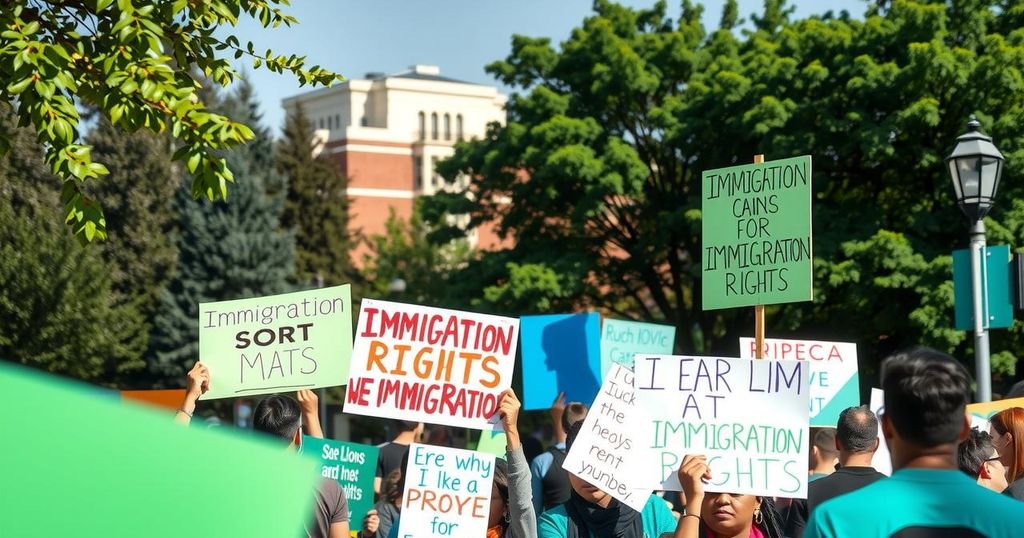Columbia Student Contesting Deportation Due to Protest Involvement Against Trump Administration
Yunseo Chung, a Columbia University student and legal permanent resident, is suing the Trump administration to halt her deportation following her participation in pro-Palestinian protests. The lawsuit challenges the targeting of activists for their political speech, highlighting increased immigration enforcement against students involved in such demonstrations. Ms. Chung’s case reflects a wider trend of governmental actions perceived as repressing free speech within academic settings.
A student at Columbia University, Yunseo Chung, is suing the Trump administration to prevent her deportation following her participation in pro-Palestinian protests. At 21 years old and a legal permanent resident since relocating from South Korea at age seven, she contends that immigration officials have unlawfully executed search warrants in various locations on the university’s campus, including her dormitory.
The legal action aims to block any attempts to detain or deport Ms. Chung, arguing the actions violate her First Amendment rights and other constitutional protections. This lawsuit is prompted by recent detention incidents involving Mahmoud Khalil, a noted activist who facilitated dialogue between university officials and the protesters.
Lawyers for Ms. Chung indicated her protests, unlike Mr. Khalil’s, did not garner significant media attention, as she refrained from making statements to the press. The Department of Homeland Security noted that Ms. Chung’s participation in demonstrations over student expulsions related to pro-Palestinian activism constituted “concerning conduct.”
Details within the lawsuit reveal that the administration’s efforts to detain her began shortly after she participated in a sit-in on March 5, 2025. Following her involvement, an arrest warrant was issued by Immigration and Customs Enforcement (ICE), prompting agents to search for her at her family’s residence shortly thereafter.
The suit characterizes the government’s actions as a retaliatory pattern against activists advocating for Palestinian rights, asserting that such actions infringe upon their core political speech. Ms. Chung is not alone, as the lawsuit also highlights similar threats faced by fellow students like Cornell’s Momodou Taal and Columbia’s Ranjani Srinivasan, both at risk of deportation.
The administration’s crackdown on student activists, especially following President Trump’s comments on perceived “un-American activities,” has escalated since Mr. Khalil’s detention. His situation, still free from criminal charges, has ignited widespread protests, particularly given the circumstances surrounding his family, including his pregnant wife, a US citizen.
The administration references the Immigration and Nationality Act to justify potential deportations, obliging the State Department to act against those deemed adversarial to U.S. foreign policy. Secretary of State Marco Rubio has outlined that this statute permits the deportation of visa and green-card holders for nearly any reason.
Compounding these developments, the Trump administration has threatened to revoke $400 million in funding for Columbia University due to alleged inadequacies in addressing campus antisemitism, imposing conditions such as protester identification requirements for funding reinstatement.
In conclusion, Yunseo Chung’s lawsuit against the Trump administration emphasizes the complexities surrounding immigration enforcement and the constitutional rights of student activists. This case sheds light on broader issues of political freedom, especially regarding dissent in relation to foreign policies. As the legal battle unfolds, it raises critical questions about the balance between national security interests and the safeguarding of individual rights, particularly in academic environments.
Original Source: www.bbc.com








Post Comment